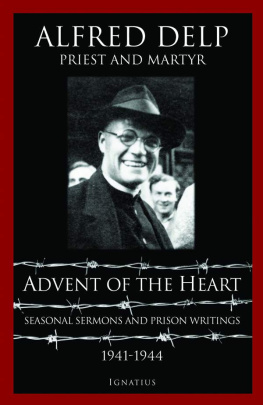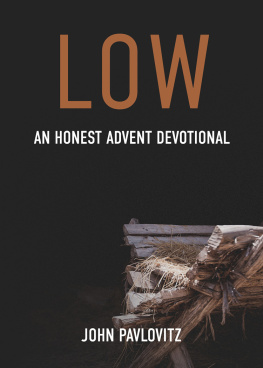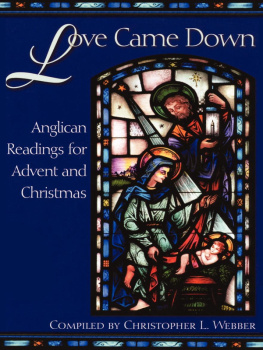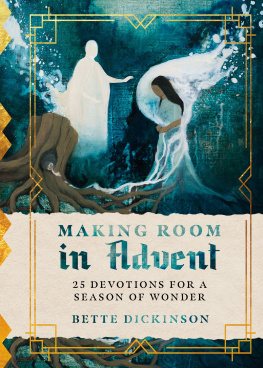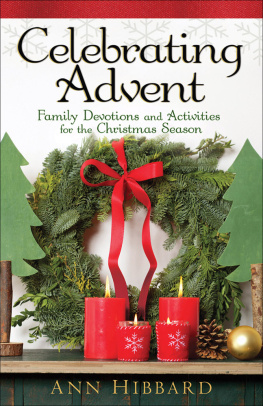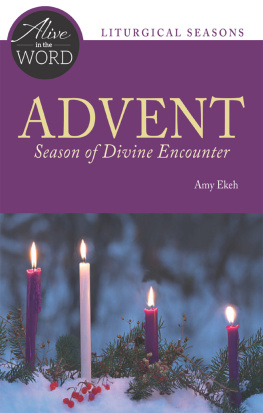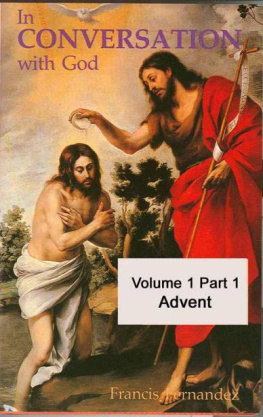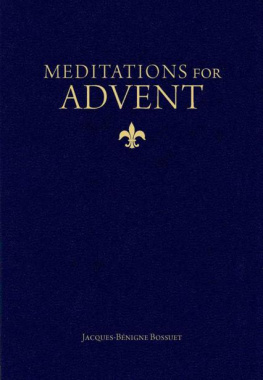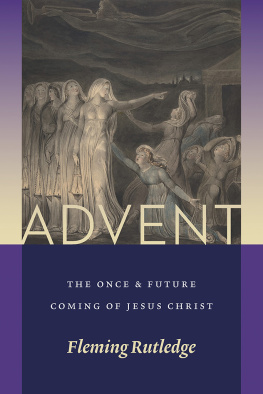ADVENT OF THE HEART
SEASONAL SERMONS AND PRISON WRITINGS
1941-1944
ALFRED DELP, S.J.
Priest and Martyr
ADVENT OF THE HEART
Seasonal Sermons and Prison Writings
1941-1944
English translation by Abtei St. Walburg
Eichsttt, Germany
IGNATIUS PRESS SAN FRANCISCO
This book is comprised of selected texts taken from
Alfred Delp: Gesammelte Schriften , volumes 1, 3, and 4,
edited by Roman Bleistein, S.J., Verlag Josef Knecht,
Freiburg im Breisgau, second edition, 1985,
and Der Mensch im Advent (foreword by Roman Bleistein, S.J.),
Verlag Josef Knecht, Freiburg im Breisgau, first edition, 1984
Cover photograph: Jesuit Archive, Munich
Cover design by Riz Boncan Marsella
2006 Ignatius Press, San Francisco
All rights reserved
ISBN 978-1-58617-081-3
Library of Congress Control Number 2005926534
CONTENTS
Week I
Week II
Advent Holy Hour
Week III
Week IV
The Christmas Vigil
FOREWORD
to the German edition of Der Mensch im Advent
Advent was one of the great themes that preoccupied Father Alfred Delp, S.J. (1907-1945), during his brief lifetime. The earliest text handed down to us from him is an Advent drama, The Eternal Advent (1933). The final Advent meditations, written on numerous small slips of paper and smuggled out of Tegel Prison in Berlin as he faced death, conclude the theme of Advent. That was Father Delps Advent of 1944. Representing the years in between, we have a text from 1935 and sermons from 1941 through 1943.
The text from 1935 originated from a series of sermons directed against the German Faith Movement, a neo-Teutonic, anti-Christian sect. Delp wrote this text while he was studying theology in Valkenburg, Holland. The sermons from 1941 through 1943 were preached at Saint Georg Church in Munich-Bogenhausen. Delp wrote the 1944 meditations in Tegel Prison, usually while his hands were in handcuffs. These meditations were smuggled out of the prison as secret messages. All of the texts presented here are taken from Alfred Delp: Gesammelte Schriften , volumes 1, 3, and 4.
Why did the theme of Advent so fascinate Alfred Delp? Presumably it was because in Advent an expectation becomes tangible, breaking through all encrustation, calling inflexibility into question, and above all, renewing the Christian and sending him on his way, on a new and unknown journey.
The mood of the Exodus, the certainty of the promise that applied to that departure, the joy of experiencing that God can be relied uponall of these are essential to Advent. Delps years had an Advent character primarily because they were filled with trouble and danger.
In this mood of expectationconfidence and doubt, insecurity and joy, audacity and certaintythe Delp of those days encounters the reader of today. Like those who lived through the war, there is one thing that we people living today know: man is a creature of Advent. He is under way.
At times, Delps language may impede the encounter between author and reader. Nevertheless, anyone who enters into his testimony will be introduced to Advent as the time of great expectation and will set out upon the way again, filled with hope. The consolation of these texts is that they encourage us toward a new and blessed departure.
Roman Bleistein, S.J.
Munich, April 27, 1984
FOREWORD TO THE ENGLISH EDITION
I welcome this English translation of Advent texts by Father Alfred Delp, S.J. I would like to thank wholeheartedly those who made this publication possible and to congratulate those who will read it. As one of the last witnesses who knew Father Delp personally, I am very pleased that this book will make him better known in America.
A victim of the Nazi dictatorship has a difficult time being remembered when no earthly gravesite exists for people to visit as pilgrims. In Germany, there are now many schools, retirement homes, parish buildings, and other sites bearing Father Delps name, but no real center for pilgrims, such as the tomb of Blessed Rupert Mayer in Munich.
What remain to us are the writings Father Delp left behind. From his imprisonment of more than six months, we have a treasury of writings that were smuggled out of the prison. Now, Advent of the Heart will begin to communicate Father Delps spiritual and intellectual legacy to American readers. This book presents Advent sermons from Father Delps parish work in Munich, alongside the powerful messages from his prison Advent experience of 1944. It is to be hoped that reading these texts will spark a desire to learn more about Father Delp.
The more one reads and reflects upon Father Delps writings, the more one clearly recognizes the prophetic message for our times! Admittedly, to our fast-living era, Father Delps language is not easy to read and understand. Nevertheless, like his Protestant contemporary, the theologian Dietrich Bonhoeffer, Delp ranks among the great prophets who comprehended the horror of Nazism and handed down a message to our times, insofar as our times are still able to comprehend and process prophetic words. It is worthwhile for us to reflect upon this message today.
Therefore, I wish this little book a successful journey, and I hope it will soon be followed by more of Father Delps words of hope.
Karl Adolf Kreuser, S.J.
Munich
TRANSLATORS PREFACE
Perhaps the best introduction to an author is to read selected texts about a subject close to his heart. Advent of the Heart offers the reader just such an opportunity, presenting Father Alfred Delps spiritual understanding of one of his favorite themes, Advent. This book was inspired by the 1984 German volume Alfred Delp: Der Mensch im Advent (Man in Advent ), edited by Roman Bleistein, S.J. (1928-2000), a collection of the Advent writings from the years 1935, 1941, and 1944.
Advent of the Heart combines the texts of Der Mensch im Advent with all other available Advent texts, as published in the most complete collection of Father Delps writings, Alfred Delp: Gesammelte Schriften . For each week of Advent, two sermons preached in Munich are followed by an Advent message written in prison. For the convenience of the reader, each section begins with the pre-conciliar Latin liturgical readings and prayers in use at that time. The English translation of the liturgical texts presented here is based upon Father Delps discussion of these texts in German, compared and corrected against German and English missal translations of the time. Where Father Delp quoted Scripture in Latin, the Latin is given first, followed by the English translation of his rendering of the text in German, if he did so. Where he offered no translation, an English translation consistent with his previous usage is added in brackets.
Additional material has also been added to aid the reader, including a biographical Introduction and a chronological summary of Father Delps life, with selected historical events that affected him and those around him (Appendix 1). The only two Advent texts unrelated to the weeks of Advent are the 1933 Advent play The Eternal Advent and the sermon sketch Advent 1935. These are placed after the Chronology as Appendices 2 and 3.
As the two forewords indicate, the original German sermon texts and prison writings are not a polished literary work. They were published posthumously, with only minimal corrections to preserve Father Delps words faithfully. Their roughness evokes a powerful sense of immediacy rooted in the suffering and danger of the times. When read aloud, the rhythm and style of Delps preaching become evident. It was a challenge to leave these qualities intact and still offer a clear and readable translation. New material and research published by Father Bleistein in the 1980s enables the German source texts to be understood and translated more faithfully to their original meaning than ever before. Great care has been taken to translate key words consistently and to identify literary, scriptural, or political references wherever possible. Father Bleisteins footnotes from Alfred Delp Gesammelte Schriften are translated in full, and additional notes by the translator are marked TRANS. Italics indicate Father Delps underlining, as published in Father Bolkovacs earlier collections of sermons and prison writings.
Next page
